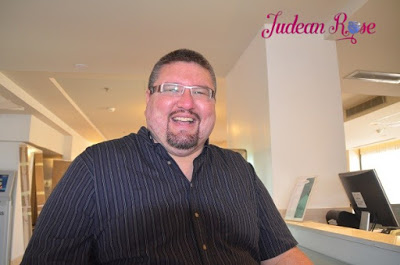
 |
| Ryan Bellerose (photo credit: The Real Jerusalem Streets) |
Ryan Bellerose as an advocate for Israel seems an unlikely choice. Now 43, Ryan grew up in Northern Alberta, Canada. He spent half the year living with his dad on the Métis Settlement in Paddle Prairie, and half with his mother in town.
As an adult, Ryan has had an eclectic career trajectory. He operated heavy machinery in the far north, running bulldozers and backhoes; worked in forestry as a guide; fought wildfires, built ice bridges; and served as a GPS GIS consultant. From there he moved into security contracting, and then on to Telecom as a business analyst.
Nope. It’s hard to connect the dots from any of those things to supporting Israel. The only way to really understand Ryan Bellerose on Israel, is to listen to him. On social media, he is blunt, sometimes to the point of rudeness. If you say something he deems stupid, he won’t hold back. He will call you “asshat.” But he will also tell you the truth as he sees it. And I see that as a valuable commodity in a friend.
Ryan is one of the more interesting people I know in the pro-Israel advocacy world. And he is awesome. I present him here to you, warts and all:
Varda Epstein: People like to label. I am pretty sure a lot of people, when they think of you or have to describe you to others, say, at least in their minds, “Ryan is that pro-Israel Native American guy.” You’re Métis. Can you tell us a bit about the Métis people, and your genealogy?
Ryan Bellerose: My people are Métis and Cree. My father is Métis and Cree, his father was Métis, and his Mother was Cree/Métis. Our family traces back to the first Métis families and communities.
Varda Epstein: What is your connection to the politics of your community, the Métis people, and if relevant, to other indigenous peoples?
Ryan Bellerose: My father, Mervin Bellerose, was heavily involved in the indigenous struggle in Canada. He cowrote the Métis Settlements Act of 1989, was the chairman of the Paddle Prairie Métis Settlement Council for several years, and also served as its resource coordinator, which is like being chief.
Merv was also a founding member of the Settlements Appeal Tribunal (MSAT). Having watched him growing up, I realised early on that I would be a terrible politician because I have a low tolerance for BS. I have been asked to run for office, but I think the problem with Indian politics is that they are a familyocracy rather than a meritocracy. I would, of course, make an excellent benevolent dictator, but those jobs are in short supply!
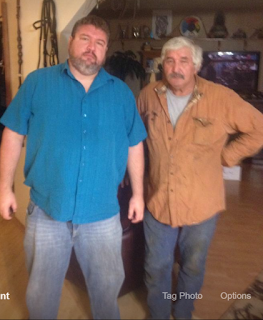 |
| Ryan Bellerose (left) and his father, Mervin Bellerose |
Varda Epstein: When did you first become conscious of Israel as more than just a foreign country?
Ryan Bellerose:I have had several “epiphanies” but honestly when I started to make friends with actual Israelis, that’s when I became more motivated to learn about these strange yet familiar people and their customs and ways. When you see people as people and not concepts it changes how you see everything. Jews are kind of mysterious to non-Jews, once I got past that, everything else came easy.
Varda Epstein: You have made a lot of enemies, even between Jews. Why is that?
Ryan Bellerose: Wow, you aren’t lobbing me any softballs, lol. To be blunt, I think that people don’t like to be reminded of their flaws and inconsistencies, and having someone who is not only willing to have hard conversations, but who is unapologetic about it, scares them.
Jews have become used to non-Jews being ignorant about Jewish history and culture at best, and hostile at worst. Many Jews themselves became complacent about their identity and so having some random Indian who isn’t Jewish, say “It’s important for Jews to BE Jews” can be threatening. After all if someone hasn’t really considered their identity much or spent any effort understanding it, having an outsider tell you how important it is, could be seen as a hostile act.
My father has a saying “ comfort is the enemy of identity” and he used that to explain to me why Métis who lived in the bush, stayed Métis, while many who went to live among the whites, assimilated at the first opportunity. I talk a lot about the importance of identity, and for people who struggle with their own identity, being told how important it is, can be daunting. It’s easier to attack the guy talking about it, than to really dive deep into the subject.
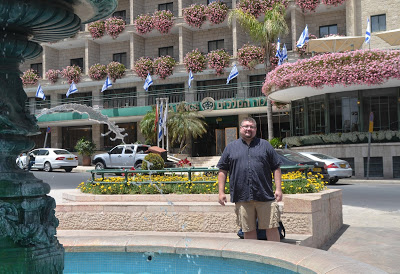 |
| Ryan Bellerose at the Kings Hotel, in Jerusalem (photo credit: The Real Jerusalem Streets) |
I am going to say something controversial here, I believe that often antisemitism is rooted in jealousy and a feeling of “why do these people think they are so special?” I believe that the Jews who are upset with me are motivated by something similar: they are upset because a non-Jew not only spent the time and effort learning about Jews and Judaism that they have not, but that he has actually shown some insight that they lack but feel entitled to. They’re thinking:
“What’s so special about this guy?”
I always say “knowledge comes from effort, not osmosis.” This bothers my critics who up until now, always got away with simply saying “I am a Jew therefore I automatically know more about Jews than any non Jew”.
I think those Jews get upset that a non-Jew would even spend the time learning about Jews. I find that Jews who are very strong in their identity, are comfortable with me and the way I speak because they understand it comes from a place of commonality: I am not trying to replace them and I actually listen and apply what I hear.
I spent time listening to and talking to actual Rabbis, and scholars BEFORE forming my opinions. I take that information, filter it through my lens, and share my insights and what I have learned. And one thing I have learned is that there is always more to learn, and that it’s a lot of work but it’s totally worth it, lol.
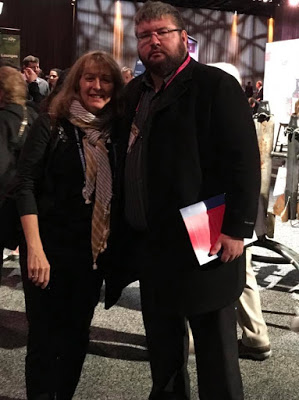 |
| Ryan in Seattle with Iris Breidbord Langman |
Varda Epstein: Ryan, let’s stipulate: you’re smart. Growing up, were you smarter than the other kids you knew? Were you always this tough and straightforward?
Ryan Bellerose: Haha. I was pretty precocious. Merv (my dad) used to say that if there was a question I hadn’t asked, he never heard it lol.
Growing up, I tended to get in trouble a lot because I was always doing things like building a parachute out of my grandmother’s handmade quilt and some binder twine and other ridiculous things. I was the youngest grandchild on my father’s side for most of my early childhood, but was kind of the ringleader of my older cousins because of my “plans.” I was also really good at talking my way out of trouble when those plans invariably went awry.
Varda Epstein: I had always imagined you as a little boy, reading some book about Israel and discovering this indigenous people who got back their land, and that the idea gave you hope.
Ryan Bellerose: I was always pro-Israel because as a kid, out of everything I learned during my Catholic school days, I always liked the Maccabee stories best. I actually pissed off the priest once: they were asking all the kids which story was their favourite in the bible and why, and I said “I like the story of the Maccabees,” and then I said, “Because they kicked ass.”
Hahahaha. They sent me home.
Merv still laughs about all my arguments with the priest, lol. Father Mercredi just hated me, I think.
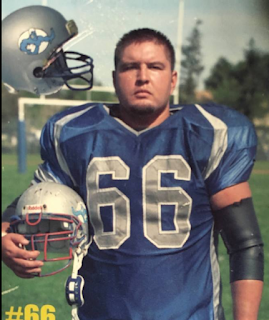 |
| Ryan Bellerose has worn many hats, including this helmet, back when he played defensive tackle for the Calgary Wolfpack |
Varda Epstein: Ouch. Hated you not just on Mercredi, but on every day of the week?
Ryan Bellerose: Hahahaha. But back then, in my school days, Israel was just an ancient place that I thought was kind of cool, and I always sided with the Jews against the Hellenists and the Romans, lol.
When my dad brought me that book about Entebbe, “Operation Thunderbolt,” Israel was still sort of a mythical place to me. But when I started getting to actually know Israelis, suddenly It was like it all came together: this place I had always thought of as somewhat mythical was not just real, but that it was a group of indigenous people who somehow made it happen.
You might say I was interested in historical Israel when I was young, probably 7 or 8, then again in junior high, but it was just after university that I started realising that the struggle of the Jewish people was so similar to my people, and it all started because an anti-Israel asshat invited me into a political discussion group to “educate” me. That’s where I met a terrible person named Greta Berlin and she pissed me off so I started standing up for Israel and wrote my first article in 2013.
Varda Epstein: I don’t know about your first article, but I certainly remember Who’s Indigenous as I believe I did some light editing on that one, and even gave it its title, on Dave Lange’s Israellycool site.
I link to that piece all the time because it’s so damned good. And not because I fixed a few typos or gave it a name. It’s brilliant, Ryan. But why do people think “indigenous” as it relates to people, means the people who were there first? How can we change their minds?
Ryan Bellerose: It’s because they use Wikipedia and YouTube for everything. “Indigenous” in regard to human beings, means your people had a cultural development and a coalescence as a people on an ancestral land. It has nothing to do with time and everything to do with connection. A little knowledge is a dangerous thing, and when it comes to indigenous status, this truism is even more valid.
Varda Epstein: Can you tell us about your friendship with Ari Fuld?
Ryan Bellerose: I don’t really like talking about Ari. I am not really a sociable person and I don’t make a lot of friends. So losing an actual friend was hard.
Ari was a good man who was underappreciated when he was alive. I don’t think people understood the amount of effort or work that Ari put into the pro-Israel cause. I remember how much it bothered me to see people mocking his strength of purpose and calling him stuff like “zealot” when really all he was doing was defending his people and showing everyone by example, what it means to be a proud, strong Jew who is unapologetic about being Jewish.
Also, the dude was tireless. I mean I am known for being online a lot and all over the place attending pro- and anti-Israel events and filming and confronting asshats, and if anything: Ari was even more busy than I was, lol. This was a guy who walked the walk.
We were kind of sympatico from the start. Neither of us tolerated fools and we could both be blunt, but either of us would do anything for the people we care about. I think if there were more Ari’s the world would be a better place. I always say that Ari is still here, because as long as there are people out there fighting for what’s right, Ari will be remembered.
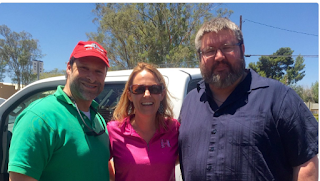 |
| From left to right: Ari Fuld (HY”D), Dr. Nan Greer, cofounder and executive director of Alistar International, and Ryan Bellerose |
Varda Epstein: Ryan, how do you see your role within the Jewish community. Do you see yourself as having a role? Wouldn’t your straightforward style tend to rule out your eligibility to serve as an ambassador?
Ryan Bellerose:I think I am a bridge-builder and a supporting character in the story of the Jewish people. I think I am both a teacher and a student, because while I may have changed the outlook of many Jews and helped them see that they are indigenous people, they have changed me and helped me learn a lot about myself and identity in general.
I would be terrible ambassador because ambassadors are politicians and I am not a politician. A politician tries to compromise and see both sides, and I am an advocate. I see the other side’s arguments but I advocate for MY side. I do not compromise unless it’s absolutely necessary because I’m not here to help the other side: They have their own advocates. So that’s not how I see my role anyway.
I am a friend, an advocate, an educator and a pathfinder. I am teaching non-Jews that Jews are just people who should be treated like you would treat anyone else, and I am teaching Indians that we need to stand with indigenous people based on facts not feelings.
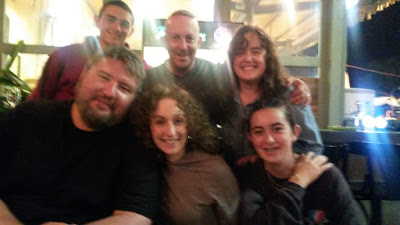 |
| Ryan, with my favorite people, the Hyman family of Efrat (photo courtesy: Leora Hyman) |
I am a pathfinder because Jews need someone they trust to be consistent and keep their word, who isn’t gonna cut and run when things get tough. The truth is that Jewish history is very similar to ours insofar as people lying to us, misleading us, and such, so in order for us to have an ambassador, we need to build bridges of trust first. That’s not easy, especially with traumatised people on both sides.
Earlier you asked me why I have so many enemies and honestly I think a large part of it has to do with my consistency. I may evolve, I may change some of my beliefs, but the core of my beliefs never changes or wavers and that scares people. I am not pro-Israel or pro-Jewish out of a religious notion or some love of democracy. I don’t see Israel as a bastion of the west in the Middle East. I genuinely love and respect Jewish people because you are indigenous people, just like me, only unlike me, you overcame massive obstacles to obtain self-determination on your ancestral lands WHILE NEVER LOSING WHO YOU ARE.
You guys have a saying during Passover, Dayenu, and it applies for me here. If you had only ever given us an example of what indigenous people can accomplish, despite all odds?
It would have been enough.
Varda Epstein: Can you describe for us your spiritual outlook, what it was and how it has changed through the years? What changed it?
Ryan Bellerose:I follow traditional Cree spirituality. It’s a pantheistic belief system that my people have always followed. Basically we believe in the Creator of all things, that we are all part of the Creator but we are not the Creator.
I was raised Roman Catholic because that was my mother’s belief system, My father was extremely anti-religion because of his experiences with residential schools. I was pretty religious growing up and I slowly learned more about the issues within the Church and historically and how it treated my people and drifted away. When my fiancée was killed, I left religion entirely.
My first trip to Israel was the push to return to my indigenous beliefs. It took visiting the birthplace of Christianity to understand that I wasn’t meant to be Christian but that there was something deep and important missing from my life.
I advocate cultural resurgence, so I needed to walk the walk. Relearn my language. Learn my own people’s belief system and try harder to decolonise.
Varda Epstein: What is your life goal?
Ryan Bellerose: the short answer? To leave things better than I found them. The detailed answer? To have enough money to be comfortable; start a family and continue my family line; to build bridges between indigenous peoples; and hopefully see the resurgence of my people. I have been blessed to meet a lot of cool and interesting people along the way.
We have lots of ideas, but we need more resources to be even more effective. Please donate today to help get the message out and to help defend Israel.

Leave a Reply